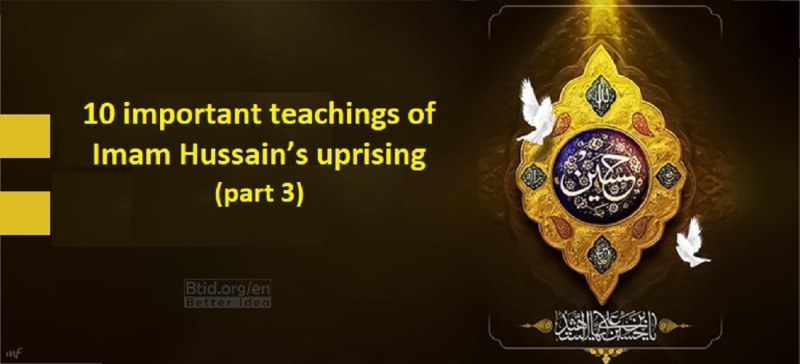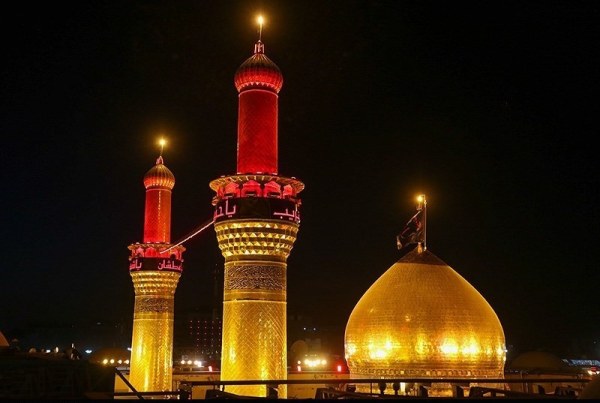Ashura is a school of love. The more people become familiar with the latent lessons in that bloody and profound movement that made humanity familiar with the sublime values and the concept of a purposive life, the more they live with honor and shake the foundations of the tyrants’ rule. In the two previous, 6 teachings of Ashura were mentioned. Now, we are going to mention some other ones.

10 important lessons and teachings of Imam Hussain ’s uprising (part 3) [1]
Ashura (the day when Imam Hussain (P.B.U.H.) was martyred) is a school of love. The more people become familiar with the latent lessons in that bloody and profound movement that made humanity familiar with the sublime values and the concept of a purposive life, the more they live with honor and shake the foundations of the tyrants’ rule.
The lessons and the teaching that can be learned from Ashura are seen in the words and deeds of Imam Hussain (P.B.U.H.) and his companions. Whoever looks carefully at this complex of events and follows it in his/her as a role model, will get acquainted with these human-making lessons.
In the two previous parts, we mentioned 6 teachings of Ashura which were 1- Tawakkul (trust in Allah), 2- satisfaction and submission, 3- doing the task, 4- freedom, 5- sincerity, and 6- self-sacrifice. Now, we are going to mention remaining ones:
7- Enjoining good and forbidding evil
One of the valuable teachings of Imam Hussain’s uprising is paying attention to two important necessary duties, enjoining good and forbidding evil. Imam Hussain (P.B.U.H.) in the will that he wrote for his brother, Mohammad ibn Hanafiyyah, when leaving Medina and in the time of farewell to him, expressed the purpose of his uprising in this way:
I did not move (and did not do uprising) for being slaphappy and arrogance nor for corruption and oppression, but only to seek reform in my ancestor's Ummah (nation). I want to enjoin good and forbidding evil and to act according to the way of my ancestor (P.B.U.H.) and my father, Ali bin Abi-Talib (P.B.U.H.).
Imam Hussain (P.B.U.H.) had also said somewhere else:
O God! I’m enthusiastic about good and hate evil.
Based on this, in various Ziyarahs (supplications) which have been quoted from infallible leaders (P.B.U.H.) about Imam Hussain (P.B.U.H.), these phrases are seen:
"I testify that you maintained prayer and paid Zakat (a legitimate payment in Islam) and enjoined good and forbad evil."

8- Denial of racism
Martyr is martyr, no difference what race, complexion and language s/he is from. White and black, Arab and non-Arab. The criterion of value and worthiness in Islam is belief and faith.
Karbala is the place of banquet of love and has every kind of martyrs. There is unity and there is no sign of racial inequality. The leader of martyrs, Imam Hussain (P.B.U.H.), utilized this religious and human teaching in the battlefield. He gave equal thanks and praise to all his companions, ranging from the old man to the youth, and from the chief of the tribe to the black slave.
9- Adherence to the human and moral principles
Ashura movement is a manifestation of valuing human rights. Companions of Imam Hussain (P.B.U.H.) on the way to Karbala involved the army of Harr ibn Yazid Riahi that blocked the way for Imam Hussain (P.B.U.H.) and his companions. Some of the companions of Imam Hussain (P.B.U.H.) suggested the Imam fight and destroy them. They gave this reason that we have enough power to fight them. But Imam Hussain (P.B.U.H.) compromised and invited his companions to patience.
Likewise, in the morning of the day of Ashura, when Shemr came forward and insulted Imam Hussain (P.B.U.H.), one of the companions of the Imam, Mouslim ibn Awsajah, wanted to kill him with an arrow, But Imam Hussain (P.B.U.H.) prevented him.
10- Eternal color and fragrance
A believer should use his/her opportunities the best and the most. When s/he wants to donate something for God’s sake, s/he should give it eternal color and fragrance so that s/he can always (even after his/her death) take advantage of it, as Imam Hussain’s (P.B.U.H.) uprising.
Basically, one of the purposes that Islam made Waqf (dedication) for Muslims is that the file of their good deeds would not be closed and they would take advantage of its reward until the Day of Judgement. Hence, the dead regret and wish they had been able to return to this world for a moment to do good deeds.
Conclusion
Ahura is a great event containing many lessons and teachings for humanity until the Day of Judgement. Every religious scholar may discover new lessons from it. Nevertheless, we mentioned only 10 prominent teachings and lessons from it.



